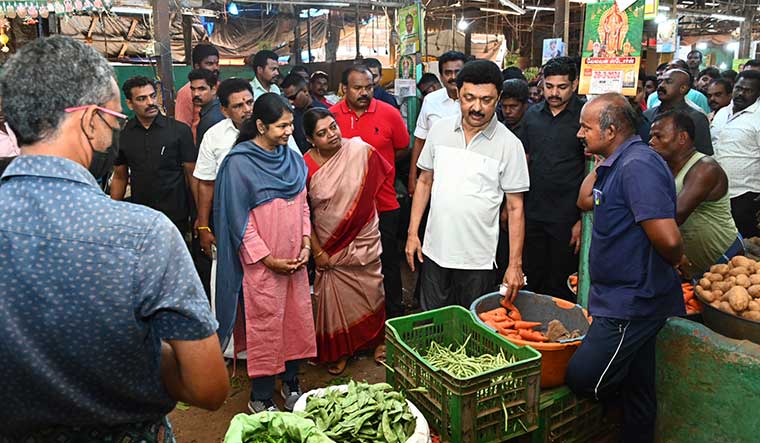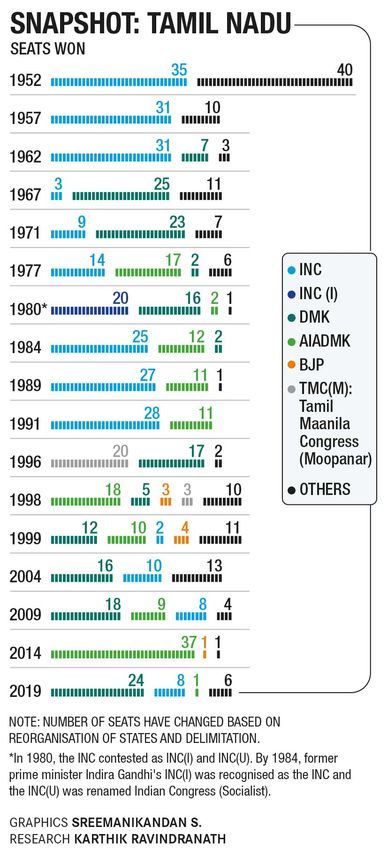It is 7am on March 30. The morning is pleasant, and the vegetable market at First Agraharam in Salem, Tamil Nadu, is busy. A convoy of vehicles stops near the roadside shops. Chief Minister M.K. Stalin, clad in black trackpants and a pink T-shirt, steps out of his car. Cellphones go up and slogans pierce the air. Stalin indulges the clamour for selfies, interacts with women, and introduces the man by his side― T.M. Selvaganapathy, the DMK’s candidate in Salem Lok Sabha constituency. “Vote for him in the Rising Sun symbol,” he says.
The DMK hopes to sweep all 39 Lok Sabha seats in Tamil Nadu and the lone seat in Puducherry. Stalin is, technically, in a four-cornered fight on the ground with Edappadi K. Palaniswami of the AIADMK, K. Annamalai of the BJP and Senthamizhan Seeman of the Naam Tamilar Katchi. But, in pulling crowds and delivering fiery speeches, he is far ahead of rivals.
The DMK’s entire campaign revolves around Stalin and his vigorous campaign against the BJP and Prime Minister Narendra Modi. The DMK’s slogan―‘Bring down fascism; save India’―taps into the deeply entrenched anti-BJP sentiment in the state. “Modi is a myth, and that myth is breaking down,” he told THE WEEK. “Modi did not win the past two parliamentary elections in Tamil Nadu. The people are confident that the BJP, which has betrayed Tamils, the Tamil language and Tamil Nadu, will be brought down.”
The DMK has steadily built an image of Stalin as the man-in-charge. His government’s several successful welfare schemes (free bus ride and a monthly allowance of Rs1,000 for women, cash allowances for college students, and free breakfast in schools) and the handling of successive crises (the pandemic and cyclone Michaung) have become talking points in the election.
“When there were floods in Thoothukudi, the Union government did not come to our rescue. They did not give us even a single paisa. The prime minister, who visits Tamil Nadu every other day, did not come when we were in distress,” said Kanimozhi Karunanidhi, DMK deputy general secretary and Lok Sabha member from Thoothukudi.
The DMK and its allies―the Congress, the CPI(M), the CPI, the Viduthalai Chiruthaigal Katchi, the Indian Union Muslim League and the Marumalarchi Dravida Munnetra Kazhagam―have fielded more than a dozen incumbent MPs. The alliance’s star campaigners include Kanimozhi, actor Kamal Haasan and Sports Minister Udhayanidhi Stalin.
Known for his one-liners, Udhayanidhi calls Modi ‘Mr 29 paisa’. “If we pay Rs1 as tax to the Central government, it gives back only 29 paisa to the state in return. If our chief minister is able to deliver on the promises with just 29 paisa, imagine how much he can do if he gets our due from the Union government,” says Udhayanidhi in his campaign speeches. He also reminds people to ask Modi about old promises―two crore jobs, Rs15 lakh in every Jan Dhan account, and an All India Institute of Medical Sciences in Madurai.
But, rhetoric aside, the DMK’s campaign lacks energy. Party cadres appear a bit too confident, as surveys have predicted that their alliance would sweep the polls. The DMK also seems to have got the caste calculus right. For instance, the Forward Bloc, which represents the dominant Thevar community, has been brought into the fold.
The DMK is ahead arithmetically, but the AIADMK is putting up a good fight in all constituencies. The AIADMK had broken ties with the BJP months earlier, but its alliance still includes parties such as Desiya Murpokku Dravida Kazhagam, the Social Democratic Party of India and K. Krishnasamy’s Puthiya Tamilagam. The DMDK is contesting in five constituencies, while the SDPI and the Puthiya Tamilagam have bagged one seat each.
Unlike the DMK, the AIADMK is trying to put the focus on state politics, saying it is not necessary to criticise the Union government. Palaniswami insists that the fight in Tamil Nadu has always been between the two dravida majors. “There is huge anti-incumbency on the ground. People do not want to vote for the DMK or the BJP. They want EPS (Palaniswami) back,” said AIADMK spokesperson and former minister D. Jayakumar.
With most of the party’s prominent leaders choosing not to contest, Palaniswami has fielded moneybags in many constituencies. The party candidate in Erode, Aatral Ashok Kumar, is worth Rs583 crore and is the son of a former MP. In Tiruchirapalli, the AIADMK has fielded P. Karuppaiah, a relative of P. Karikalan, a sand mining baron who had come under the Enforcement Directorate scanner recently.
The idea, apparently, is to strengthen the ranks of Palaniswami supporters in the party. “Fielding newcomers is not new for the AIADMK,” said Jayakumar. “Both our leaders, MGR (founder M.G. Ramachandran) and Amma (former chef minister J. Jayalalithaa), had always given opportunities to the next generation. This will only energise the party and ensure democracy.”
The AIADMK is focusing on eight constituencies in the Kongu region in western Tamil Nadu, where the party had performed well in the 2021 assembly elections. “The INDIA bloc cannot come to power,” said Palaniswami during a campaign event in Coimbatore. “The alliance is a mixed bag of parties with different ideologies. How can they come together?”
Under Annamalai, the BJP has stitched a strong alliance of nine parties that includes the Pattali Makkal Katchi, the Amma Makkal Munnetra Kazhagam (AMMK) and G.K. Vasan’s Tamil Maanila Congress. The BJP is contesting in only 23 seats, and has fielded prominent faces to increase its vote share. Its allies, especially the AMMK, are expected to split votes of other dravida parties in several constituencies.
“Palaniswami did a blunder by giving 10.5 per cent reservation to the Vanniyar community when he was in power,” AMMK leader T.T.V. Dhinakaran told THE WEEK. “He had actually cheated the Vanniyars and betrayed members of the Thevar community, who were the AIADMK’s traditional voters.”
The BJP has benefited from Annamalai’s image of being a bold leader who opposes the dravida majors and has stitched up an alliance sans the AIADMK. He has been helping the BJP score brownie points, the latest being in the controversy regarding prime minister Indira Gandhi recognising the sovereignty of Sri Lanka over Katchatheevu.
His tenure as party president, however, has been marked by tensions within the party. Many prominent faces have either been sidelined or been forced to quit the BJP. One of them, the prominent dalit face D. Periyasamy, defected to the AIADMK as he was denied a seat to contest. Also, Annamalai allotted the Thenkasi seat to John Pandian of the Thamizhaga Makkal Munnetra Kazhagam, even though the BJP’s Ananthan Ayyasamy had been cultivating it by working closely with Sridhar Vembu, the founder-CEO of Zoho Corporation who hails from Thenkasi.
The Seeman factor could also influence the poll outcome. His Naam Tamilar Katchi is contesting in all 40 constituencies, including the one in Puducherry. A vocal advocate of the Tamil cause, Seeman has been campaigning across the state against dravida parties, the BJP and the Congress. At least 16 candidates of his party are doctors. Vidhya Veerappan, former BJP leader and daughter of the late bandit Veerappan, is contesting on the NTK ticket from Krishnagiri. His party may not make a huge impact, but Seeman has turned into a crowd-puller who could play the part of a spoiler by eating into AIADMK and BJP votes.



